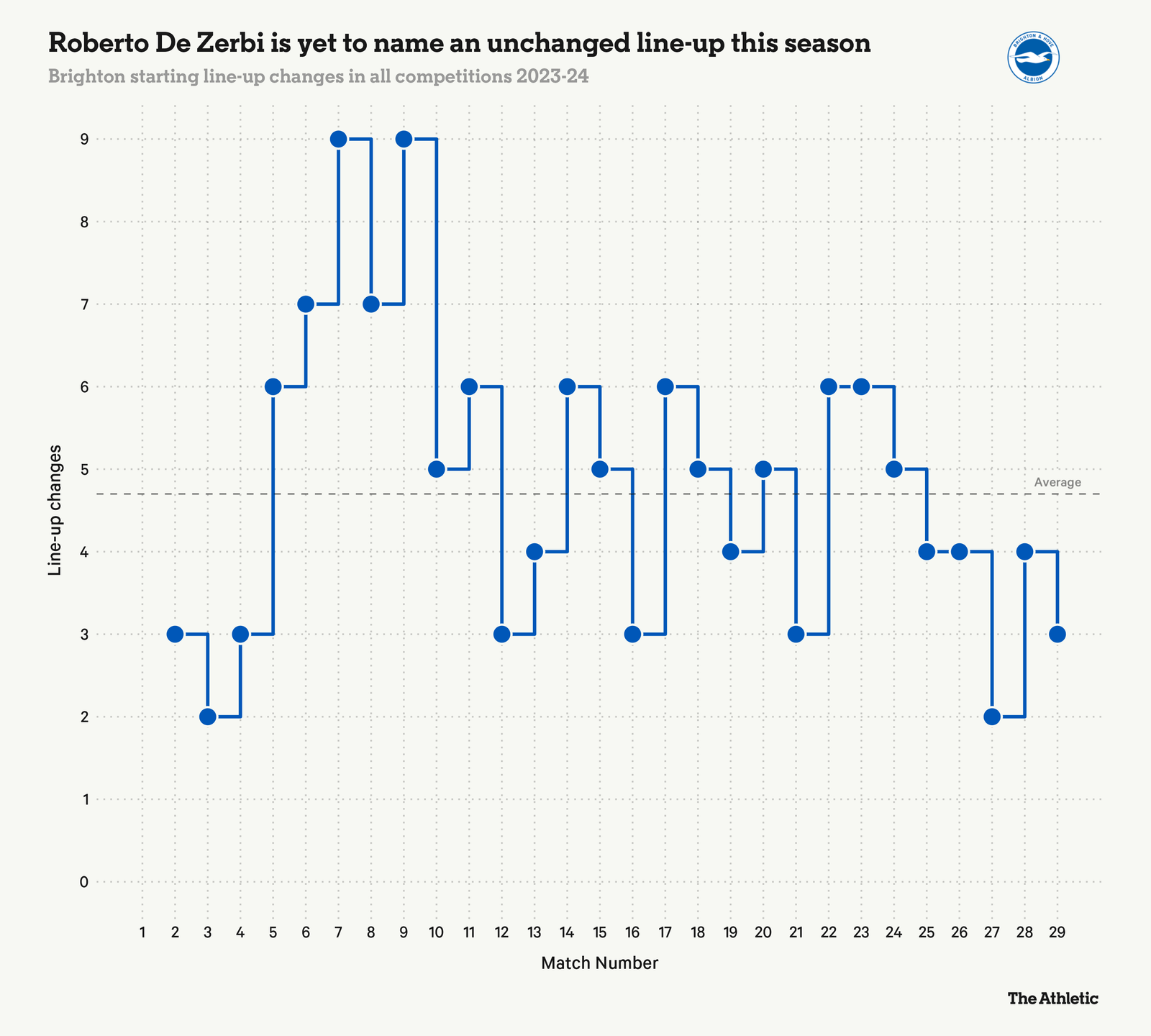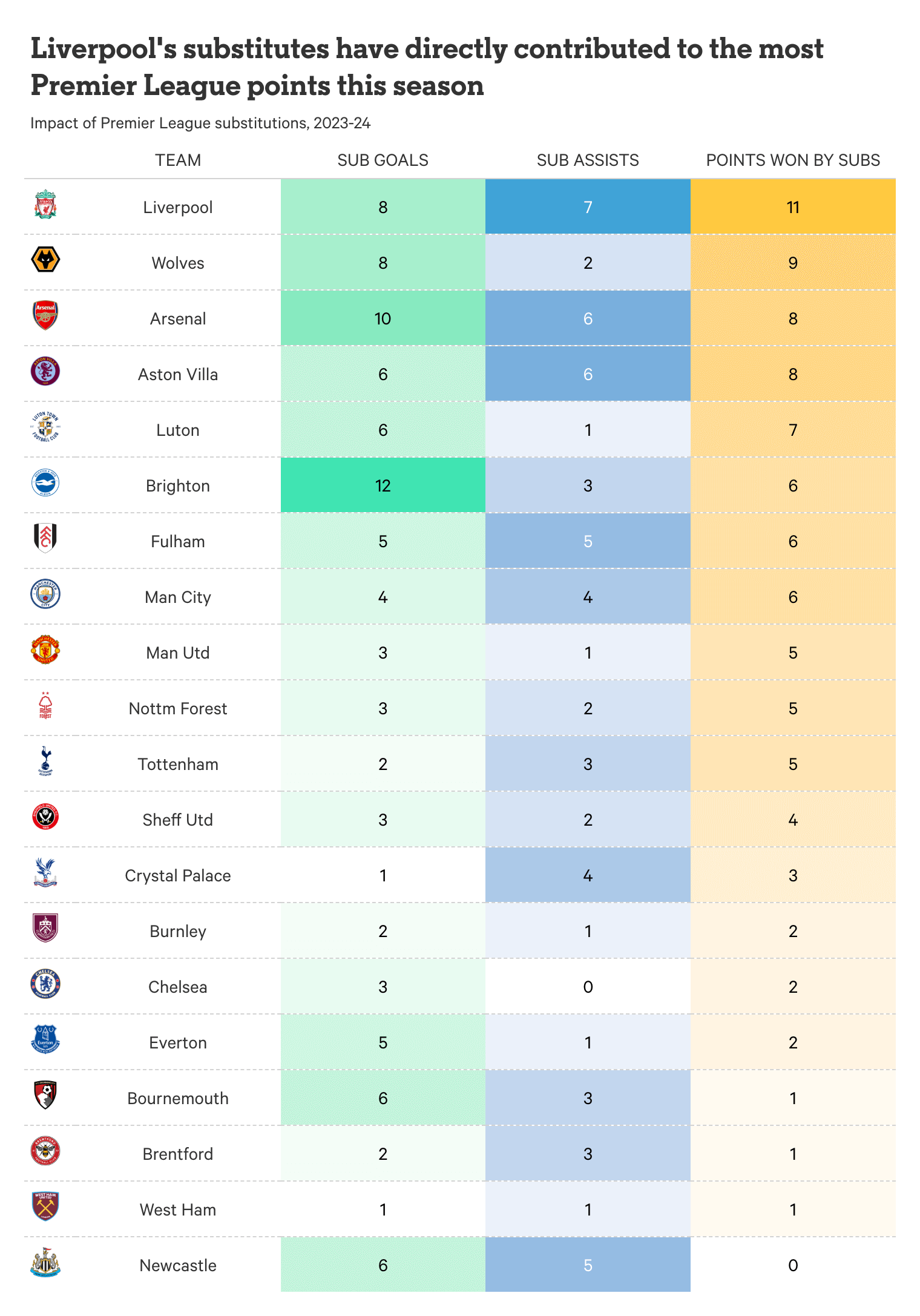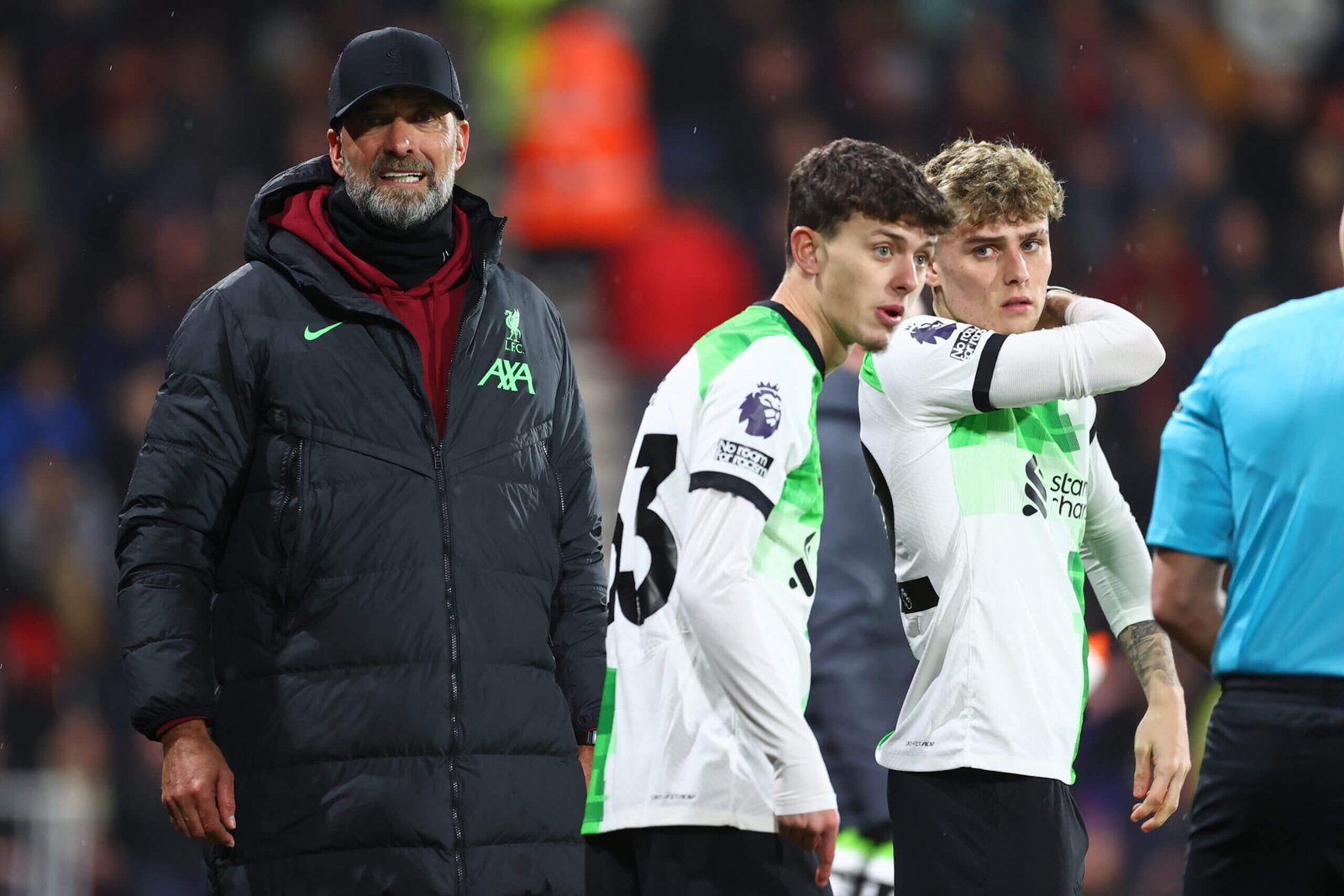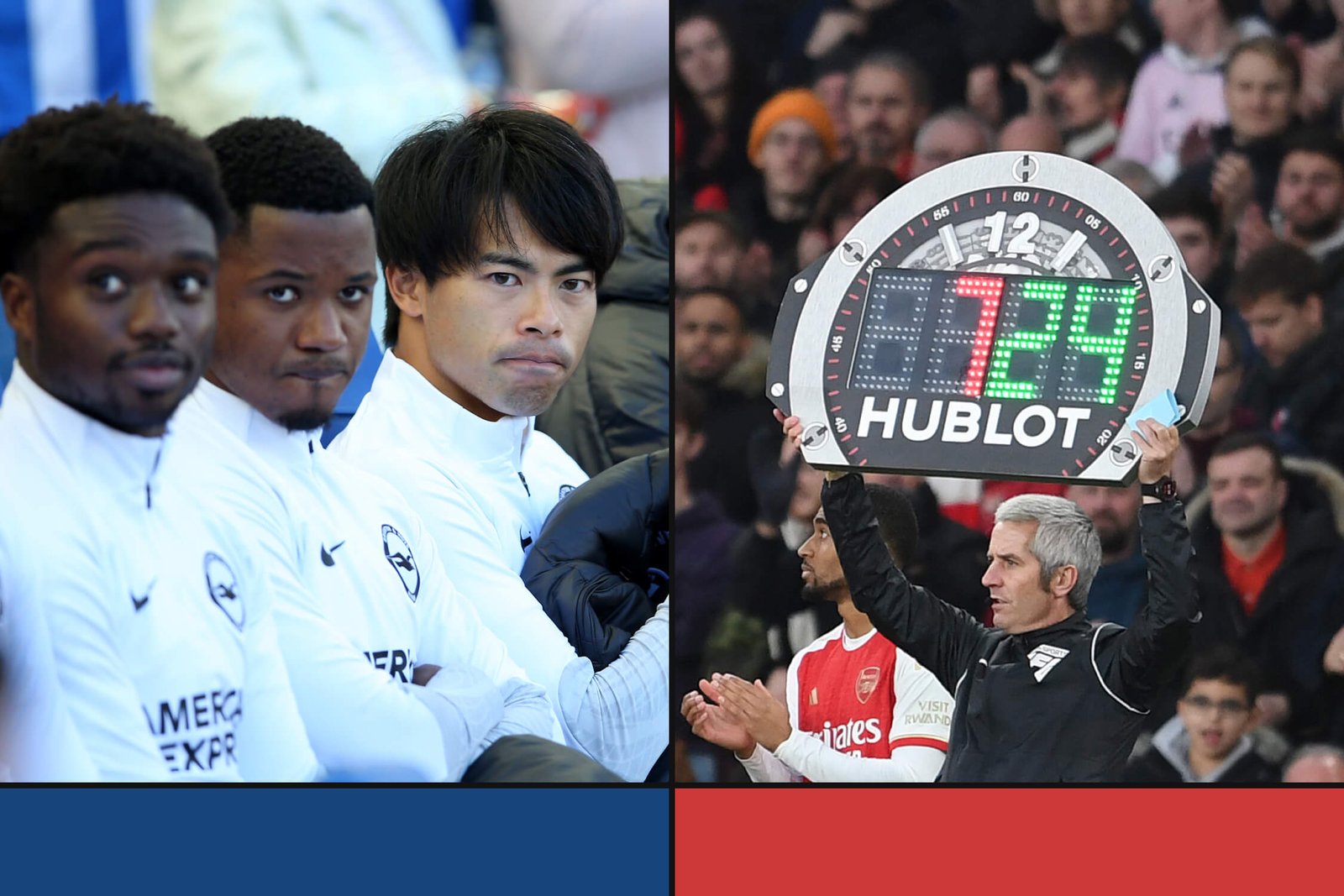In modern football, nothing is immune to change — not even the ways teams make changes.
At the start of the 2022-23 season, Premier League clubs voted to increase the number of permissible substitutions from three to five, a decision taken with player welfare in mind. Pedri’s 75-game season for club and country two years ago, along with the seven muscular injuries the 21-year-old has suffered since, serves as a case for carefully managing a player’s minutes.
Originally met with scepticism, the decision stoked fears that only the biggest clubs with the deepest squads would benefit, but that has not necessarily been the case.
Let’s start with the obvious: more opportunities to make substitutions have led to… more substitutions.
The current campaign is almost on course to break last season’s record, when Premier League teams made 2,985 in-game changes, an increase of 40.5 per cent on the last of the three-sub seasons.
These numbers are more revealing if we hone in on individual sides and, crucially, filter only for tactical substitutions, rather than those enforced by injury.
Of the 20 Premier League teams this season, Manchester City have made the fewest unforced in-game tweaks and Pep Guardiola is also the only manager to not make a substitution in a game this season. He ignored his bench twice: a 1-0 win over Newcastle United back in August and the 1-1 draw with Liverpool in November.
Adjusting to a per-game basis, West Ham United, City, Everton and Crystal Palace are the four teams to make fewer substitutions per game than the original rules permitted.
David Moyes, Sean Dyche, Roy Hodgson… and Guardiola: the traditionalists.
It is a stylistic approach that Guardiola has defended repeatedly, arguing that if the team is playing well, then sticking to the plan is the way forward. “I have the opportunity to make five substitutions but I am the manager and I take them if I want,” said Guardiola last season. “Having five substitutions doesn’t mean I have to use them.”
In that substitution-free win over Newcastle, a fan asked him to make some changes. “Which one?” replied Guardiola. “Come here and do it.”
Feeling that the team was “still alive”, Guardiola also considers benched players’ ability to adapt to the game. “Sometimes, to come in, the rhythm is difficult,” he said.
Guardiola’s resolve is not affected by the score, either.
Although they rarely find themselves chasing the game — City have trailed for only 205 minutes this season — Guardiola has only made four substitutes in losing positions. That equates to around 51 minutes per substitute, more than double the amount of time it takes any other Premier League side to look to the bench in such circumstances.
Their latest in the league — bringing Kevin De Bruyne into the action when they were 2-1 down against Newcastle in January — could not have gone much better.
KDB IS BACK! 👑
Kevin De Bruyne comes on and produces a wonderful finish in his Premier League comeback game 👏
📺 @tntsports & @discoveryplusUK pic.twitter.com/8YoTBBztiB
— Football on TNT Sports (@footballontnt) January 13, 2024
On the flip side, Roberto De Zerbi’s Brighton are the team exploiting the rule change the most, averaging close to the full complement of five changes per game. Of a possible 110 substitutions this season, they have made 98, with De Zerbi opting for all five changes in 16 of Brighton’s 21 Premier League games.
De Zerbi is well-known for his restlessness on the touchline, so these numbers may not come as a surprise. With four competitions to cope with this season, regular substitutions work alongside the continuous tweaks to his starting XI and help keep the plates spinning.

What’s even more distinctive is how early De Zerbi looks to switch things up during games, often tinkering with build-up structures in the process. His pair of double substitutions against Burnley last month — the first at half-time and the second in the 59th minute — are typical of his relentless efforts to tip the tactical tide.
Clocking an average substitute time of 66.9 minutes, no team makes a greater proportion of their changes in the opening 15 minutes of the second half, or a smaller proportion of their changes after the 75th minute, than Brighton.
De Zerbi has also made 15 substitutions at half-time, with Kaoru Mitoma and Joao Pedro entering the fray three times each after the break, and Adam Lallana making way four times, more than any other player in the division.
Put simply, he likes to give his players ample opportunity to affect the game.

Meanwhile, rivals Crystal Palace are the only side not to make a tactical change at the break. Roy Hodgson likes to leave it late, making 51.1 per cent of his substitutions in the final 15 minutes of normal time — the highest share in the league during that time interval.
Hodgson, 76, has faced battles with his bench this season, saying his team “became much weaker” after his changes in a 2-1 defeat to Tottenham Hotspur back in October. Amid concerns over squad depth, Palace’s reluctance to make in-game tweaks feels rather more enforced.
West Ham like to leave things late, too, making 17.0 per cent of their substitutes after the 90-minute mark, but it is Chelsea who take the crown for stoppage-time substitutions, having made 11 this season. All but one of those changes came with Mauricio Pochettino’s side in the lead, suggesting that he likes to save a switch or two to run down the clock.

Mauricio Pochettino replaces Raheem Sterling for Ben Chilwell (Chris Brunskill/Fantasista/Getty Images)
Although there is a sweet spot for in-game tweaks — the 72-minute and 44-second mark, if we take the average time of all tactical substitutions since the new ruling was introduced — the opportunity to make five changes has seen novel approaches to game management emerge.
There are many ways to assess the impact of substitutions, but the simplest is in terms of their goals and assists.
Considering Brighton’s 4.7 changes per game, it is no surprise to see that they have scored the most goals from the bench in the Premier League this season (12). When factoring in assists, Arsenal’s 16 goal contributions from the bench top the charts.
However, a goal or an assist that changes the score from 3-0 to 4-0 isn’t of the same value as one that helps the team turn a loss into a draw, or a draw into a win.
And that’s why Jurgen Klopp’s mid-game adjustments this season have been instrumental in Liverpool reaching the summit of the Premier League table. Darwin Nunez’s goals away to Newcastle, Luis Diaz’s equaliser against Luton Town, and Harvey Elliot’s winner versus Palace have contributed to a league-high 11 points won from the bench.
Wolverhampton Wanderers manager Gary O’Neil, meanwhile, has turned three draws into late wins with his subs. Sasa Kalajdzic twice came off the bench to score winning goals at Everton and Bournemouth, before Pablo Sarabia kickstarted a memorable comeback win over Spurs.

That said, the impact of the substitutes isn’t only in their goals and assists. It could be a tactical change that alters the team’s shape in or out of possession, or a change in the profile of the players despite maintaining the same attacking or defensive approach.
In Liverpool’s victory against Wolves in September, Klopp replaced Alexis Mac Allister with Diaz at half-time, one of just three tactical tweaks the German has made at the break this season. In so doing, the shape changed to a 4-2-4 on the ball with full-backs Joe Gomez and Andy Robertson providing the width. The adjustment helped Klopp’s side turn a 1-0 loss into a 3-1 Liverpool victory, even if Diaz did not directly contribute to the scoreline.

Jurgen Klopp’s substitutions have been crucial this season (Charlotte Wilson/Offside/Offside via Getty Images)
Another example is Guardiola’s rare decision to switch to a back five against Nottingham Forest in City’s 2-0 victory in September. After Rodri’s dismissal, Steve Cooper introduced Anthony Elanga and Callum Hudson-Odoi for Ibrahim Sangare and Serge Aurier, switching from a 5-3-2 to a 4-2-3-1 in the process.
Forest’s threat down the wings against City’s 10 men pushed Guardiola to tweak the system by substituting Julian Alvarez with Nathan Ake and switching to a back five.
“I saw one minute they arrive so easy to the sides, and they drop us. After, with five in the back, we can arrive better in the sides to control that,” said Guardiola after the game.
Multiple factors affect in-game changes in football: game state, players’ fitness, squad depth and variety, players’ performances, and tactics. All of these are taken into consideration when the manager and coaching staff are making up their minds.
Even in the five-substitution age, they are rarely made for substitution’s sake.
(Top photos: Getty Images)
Read the full article here


